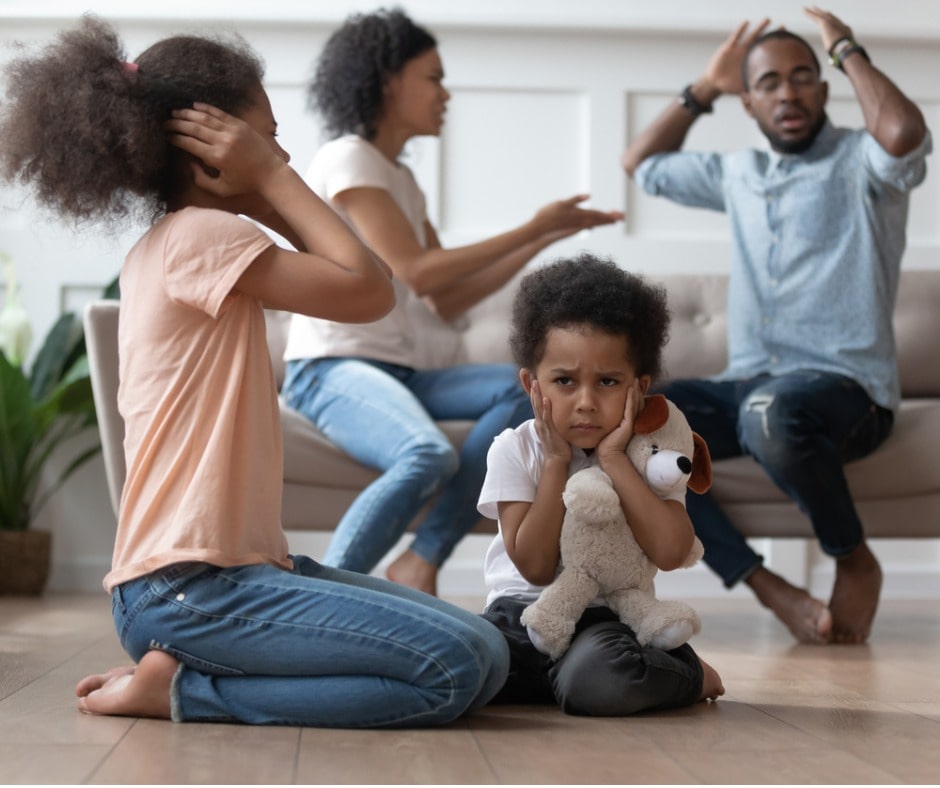My parents fight all the time in front of me
What Happens to Children When Parents Fight — Developmental Science
When I was a child, my parents’ fights could suck the oxygen out of a room. My mother verbally lashed my father, broke jam jars, and made outlandish threats. Her outbursts froze me in my tracks. When my father fled to work, the garage, or the woods, I felt unprotected. Years later, when my husband and I decided to have children, I resolved never to fight in front of them.
“Children are like emotional Geiger counters,” says E. Mark Cummings, psychologist at Notre Dame University, who, along with colleagues, has published hundreds of papers over twenty years on the subject. Kids pay close attention to their parents’ emotions for information about how safe they are in the family, Cummings says. When parents are destructive, the collateral damage to kids can last a lifetime.
As a developmental psychologist I knew that marital quarreling was inevitable but I also knew that there had to be a better way to handle it. Cummings confirms: “Conflict is a normal part of everyday experience, so it’s not whether parents fight that is important. It’s how the conflict is expressed and resolved, and especially how it makes children feel that has important consequences for children.” Watching some kinds of conflicts can even be good for kids—when children see their parents resolve difficult problems, Cummings says, they can grow up better off.
What is destructive conflict?
In their book Marital Conflict and Children: An Emotional Security Perspective, Cummings and colleague Patrick Davies from the University of Rochester identify the kinds of destructive tactics that parents use with each other that harm children: verbal aggression like name-calling, insults, and threats of abandonment; physical aggression like hitting and pushing; silent tactics like avoidance, walking out, sulking or withdrawing; or even capitulation—giving in that might look like a solution but isn’t a true one.
When parents repeatedly use hostile strategies with each other, some children can become distraught, worried, anxious and hopeless. Others may react outwardly with anger, becoming aggressive and developing behavior problems at home and at school. Children can develop sleep disturbances and health problems like headaches and stomachaches, or they may get sick frequently. Their stress can interfere with their ability to pay attention and create learning and academic problems at school. Most children raised in environments of destructive conflict have problems forming healthy, balanced relationships with their peers. Even sibling relationships are adversely affected—they can become overinvolved and overprotective of each other, or distant and disengaged.
Some research suggests that children as young as six months register their parents’ distress. Studies that follow children over a long period of time show that children who were insecure in kindergarten because of their parents’ conflicts were more likely to have adjustment problems in the seventh grade. A recent study showed that even 19-year-olds remained sensitive to parental conflict. Contrary to what one might hope, “Kids don’t get used to it,” says Cummings.
A recent study showed that even 19-year-olds remained sensitive to parental conflict. Contrary to what one might hope, “Kids don’t get used to it,” says Cummings.
In 2002, researchers Rena Repetti, Shelley Taylor, and Teresa Seeman at UCLA looked at 47 studies that linked children’s experiences in risky family environments to later issues in adulthood. They found that those who grew up in homes with high levels of conflict had more physical health problems, emotional problems, and social problems later in life compared to control groups. As adults, they were more likely to report vascular and immune problems, depression and emotional reactivity, substance dependency, loneliness, and problems with intimacy.
Some parents may think that they can avoid impacting their children by giving in, or capitulating, to end an argument. But that’s not an effective tactic. “We did a study on that,” Cummings said. According to parents’ records of their fights at home and their children’s reactions, kids’ emotional responses to capitulation are “not positive. ” Nonverbal anger and “stonewalling”—refusing to communicate or cooperate—are especially problematic.
” Nonverbal anger and “stonewalling”—refusing to communicate or cooperate—are especially problematic.
“Our studies have shown that the long-term effects of parental withdrawal are actually more disturbing to kids’ adjustment [than open conflict],” says Cummings. Why? “Kids understand hostility,” he explains, “it tells them what’s going on and they can work with that. But when parents withdraw and become emotionally unavailable, kids don’t know what’s going on. They just know things are wrong. We’re seeing over time, that withdrawal is actually a worse trajectory for kids. And it’s harder on marital relationships too.”
Kids are sophisticated conflict analysts; the degree to which they detect emotion is much more refined than parents might guess. “When parents go behind closed doors and come out acting like they worked it out, the kids can detect that,” says Cummings. They’ll see you’re pretending. And pretending is actually worse in some ways. As a couple, you can’t resolve a fight you’re not acknowledging you’re having. Kids will know it, you’ll know it, but nothing will be made in terms of progress.”
Kids will know it, you’ll know it, but nothing will be made in terms of progress.”
On the other hand, he says, “When parents go behind closed doors and are not angry when they come out, the kids infer that things are worked out. Kids can tell the difference between a resolution that’s been forced versus one that’s resolved with positive emotion, and it matters.”
How do researchers study conflict?
Researchers use several methods to see how parents’ conflicts affect their children, in the home and in the laboratory. At home, parents are trained to keep records or diaries of their fights, including when they fought, what they fought about, the strategies they used, and how they thought their children reacted. In the laboratory, parents are recorded while discussing a difficult topic, and their strategies are analyzed. Children are shown videotapes of adults’ or even their own parents’ conflicts and are asked about their reactions: How would you feel if your parents did that; how would you describe what your parents are doing? Some studies also gather information from teachers, school records, or even record children’s physiological responses while watching a videotape of adults or their own parents fighting.
In a remarkable 20-year old study of interparental conflict and children’s stress, anthropologists Mark Flinn and Barry England analyzed samples of the stress hormone cortisol, taken from children in an entire village on the east coast of the island of Dominica in the Caribbean. Children who lived with parents who constantly quarreled and fought had higher average cortisol levels than children who lived in more peaceful families. As a result, they frequently became tired and ill, they played less, and slept poorly. Overall, children did not ever habituate, or “get used to,” the family stress. In contrast, when children experienced particularly calm or affectionate contact, their cortisol decreased. Both animal and human studies show that chronic activation of the stress response can change the architecture of a developing brain: turning on or off genes that regulate stress; damaging the hippocampus which can lead to impairments in learning and memory as well as the stress response; and interfering with myelination of the brain which affects the quality of nerve signal transmission.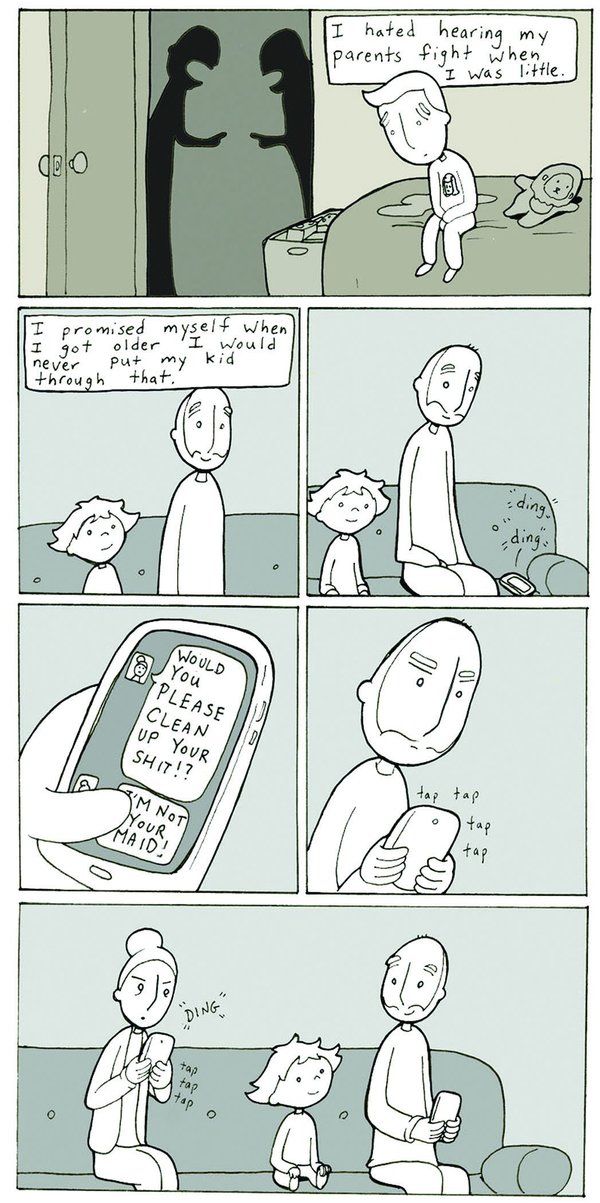
The long-term protection of constructive conflict
“Some types of conflicts are not disturbing to kids, and kids actually benefit from it,” says Cummings. When parents have mild to moderate conflict that involves support and compromise and positive emotions, children develop better social skills and self-esteem, enjoy increased emotional security, develop better relationships with parents, do better in school and have fewer psychological problems.
“When kids witness a fight and see the parents resolving it, they’re actually happier than they were before they saw it,” says Cummings. “It reassures kids that parents can work things through. We know this by the feelings they show, what they say, and their behavior—they run off and play. Constructive conflict is associated with better outcomes over time.”
Even if parents don’t completely resolve the problem but find a partial solution, kids will do fine. “Compromise is best, but we have a whole lot of studies that show that kids benefit from any progress toward resolution,” says Cummings.
Fighting escalates when partners become parents.
According to family therapist Sheri Glucoft Wong, of Berkeley, California, just having children creates more conflicts, even for couples who were doing well before they became parents. “When kids show up, there’s less time to get more done,” she says. “All of a sudden you’re not as patient, not as flexible, and it feels like there’s more at stake. People who make that adjustment successfully talk about it. They make the implicit explicit. Have compassion,” she adds.
What do parents fight about?
“I’ve been doing family therapy for four decades, and digital issues have really, really added new challenges to families,” says Glucoft Wong. “How much screen time is okay, can kids text in the car, expectations about immediate connectivity, and resentment when someone doesn’t return a call right away. Couples’ relationship time is diminished because partners are spending more time interacting with online relationships, dinnertime conversations are interrupted to fact-check, and entertainment is constantly available.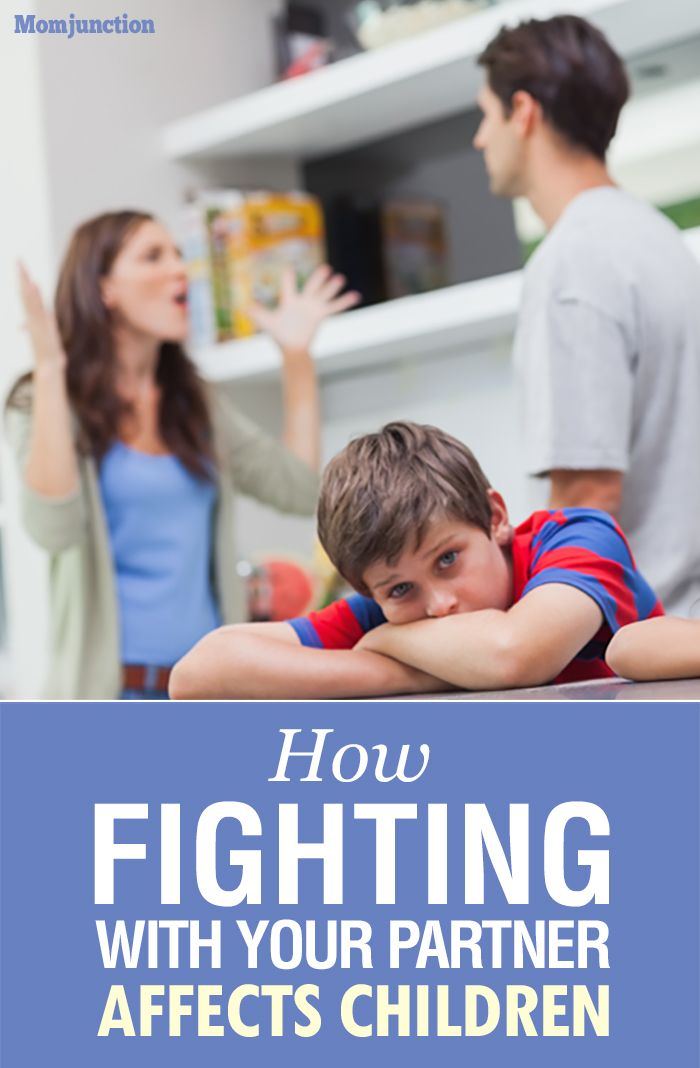 There is a whole new etiquette to work out.”
There is a whole new etiquette to work out.”
“Roommate issues” are the second big category, according to Glucoft Wong: who does what, when; comings and goings; sleeping times and arrangements, and carving out time for the parents to connect with each other. And finally, there are the usual issues of money, in-laws, friends, values, parenting, discipline, and roles.
Should parents work out their conflicts in front of their kids?
Both researcher Cummings and therapist Glucoft Wong are circumspect. Cummings: “You should be careful about the fights you have in front of your kids. What our research is showing is that parents tend to have worse fights in front of their kids. They’re unable to regulate themselves.”
Glucoft Wong’s philosophy is that home is a training ground for real life: “Little eyes are watching, and little ears are listening,” she says.
Both Cummings and Glucoft Wong agree that children can benefit if parents manage conflict well. “Parents should model real life…at its best,” says Glucoft Wong.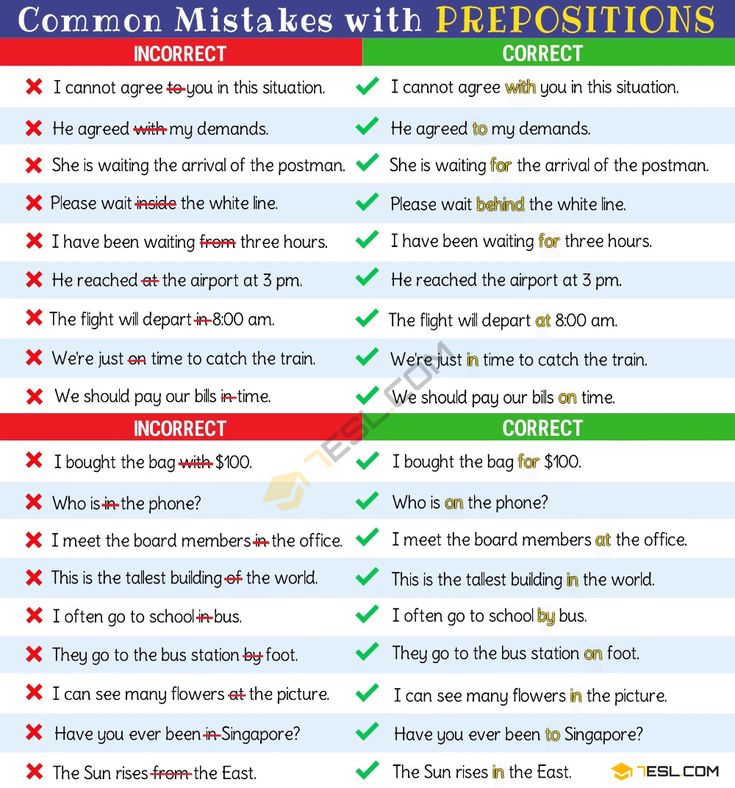 “Let them overhear how people work things out and negotiate and compromise.” But both agree that some content is best kept private. Discussions about sex or other tender issues are more respectfully conducted without an audience. Glucoft Wong encourages parents to get the help they need to learn to communicate better—from parenting programs, from books, or from a therapist.
“Let them overhear how people work things out and negotiate and compromise.” But both agree that some content is best kept private. Discussions about sex or other tender issues are more respectfully conducted without an audience. Glucoft Wong encourages parents to get the help they need to learn to communicate better—from parenting programs, from books, or from a therapist.
My own parents’ conflict no longer has the hold on me that it once did, thanks to careful work and a loving marriage of my own of thirty years. Our two daughters are now in their twenties and forming partnerships of their own, and I hope that the lessons of their childhood hold. When they were preschoolers and interrupted our disagreements with concern, my husband and I would smile and reassure them with our special code: I held my thumb and finger an inch apart and reminded them that the fight was this big, but that the love was this big – and I held my arms wide open.
Tips for Resolving Conflict
Glucoft Wong shares her top five tips to help parents resolve conflict, maintain a loving relationship, and role-model effective problem-solving for children:
Lead with empathy: Open the dialog by first letting the other person know that you see them, you get them, and you can put yourself in their shoes.
 Example: “I know it must be hard to leave work….”
Example: “I know it must be hard to leave work….”Give your partner the benefit of the doubt. Assume the best intentions and help yourself remember that you love each other by adding an endearment. Example: “I know you didn’t mean to team up with the kids against me, Sweetheart….”
Remember that you’re on the same team. Deal with issues by laying all the cards on the table and looking at them together to solve a dilemma rather than digging in on opposing sides. Then problem-solve with one another. That way you both “own” the solution.
Constructive criticism only works when your partner can do something about what happened. If the deadline for soccer signup was already missed, remedy the current situation as best as possible and talk about how to do it better next time. Blaming won’t fix anything that’s already happened.
Anything that needs to be said can be said with kindness. Disapproval, disappointment, exasperation—all can be handled better with kindness.
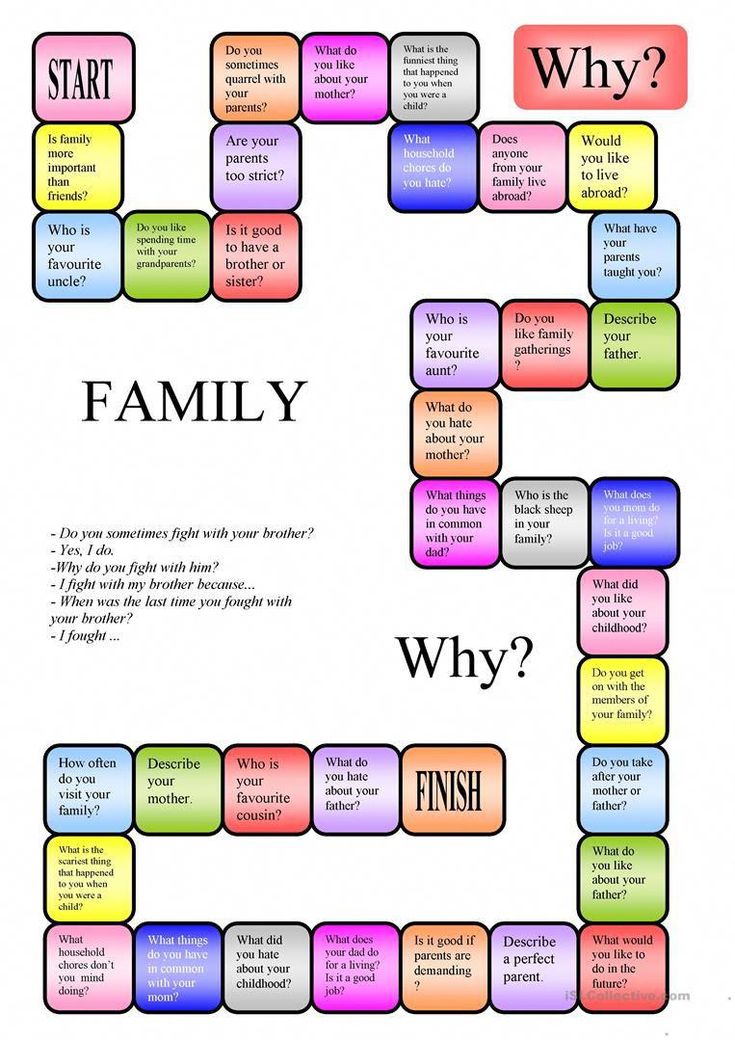
Parents fighting in front of the kids are the worst. Don’t do it. Please. : Parenting
If anyone were to take a look at my life, it would appear to be pretty good. Most people would even call me a successful person.
I am married to a lovely, understanding, and supportive wife. We are proud parents of a little girl. I own a nice house in an affluent neighborhood. I have a good standard of living from my job as a medical physicist, where I work to fight cancer using radiation. I have written and published three Kindle books: a couple of books on fatherhood and a sci-fi thriller.
And sometimes in the middle of the night, I lie sobbing in bed trying to get the demons out of my head…
It took me years to get this far, where I now enjoy a decent amount of success, peace, and happiness.
It took me years to get over my crappy childhood.
Ever since the beginning of my memory, I remember my parents fighting. I am talking about lung-screaming, vein-in-forehead-bursting fights, with horrible insults thrown both ways. I never knew when a fight was to break out. My sister, my brother and I lived in a state of fear and uncertainty of when the peace would be shattered by yet another fight.
I never knew when a fight was to break out. My sister, my brother and I lived in a state of fear and uncertainty of when the peace would be shattered by yet another fight.
As me and my siblings grew up, we endured. And as we grew up, things got worse. Way worse. Things got physical.
My father never hit us. He would hurt himself. And he would destroy any physical objects that were in front of him in his anger.
I believe it all stemmed from his lack of success in his own life. He was always a working class stiff. The great tragedy in his life, at least from his perspective, was that he never finished his graduate studies to move onto something better. (Personally, I think the great tragedy in his life was actually that his kids hate his guts forever).
As the fights got worse and more physically destructive, the police occasionally had to get involved. The last time my dad got dragged out with his pants around his ankles and the neighborhood watching. It was horrible for three young children to witness this.
After that my father moved out. Thank God.
The fighting and emotional violence ended, but the damage was done. We were all completely traumatized.
As for myself, I had serious socialization issues growing up. I had a terrible temper because I had learned it from my father. I could not relate to my peers, who were happy, affluent, and came from good families. I am pretty sure I developed some degree of post-traumatic stress disorder, hence why I sometimes wake up in the middle of the night depressed and anxious to this very day.
As a young adult, I had to re-learn how to have friends, how to interact gracefully with other human beings, and how to be at peace with my terrible temper. It took years.
I always knew that I had a choice. I could give in to my emotional trauma from my childhood and be a bum. Or I could apply myself consistently so that I could salvage myself and make a man out of me.
That’s what I did. And that’s what I do every day.
And another thing that I do every day is make sure that I am the exact opposite of my own father in raising my little girl.
My wife is on board. She, too, grew up in a family where her parents fought like cats-and-dogs.
We are absolutely resolved to have our little one (and any other kids that come along) grow up in a peaceful and happy household. There is no way my daughter is inheriting the trauma that I experienced. It is an impossibility in my mind.
As for my fight with my demons, I am getting better every day. And I really am happy. I have an awesome life and I am grateful.
So, r/parenting folks: it is so, so important to not fight. It damages kids like you wouldn’t believe. Resolve your issues maturely and peacefully.
TL;DR: Please. Don’t fight in front of your kids. The penalty shows up years later, and the piper always get paid.
EDIT: Thank you for all the support and insightful comments. I think that something that really came out in the comments is that teaching kids how to resolve conflicts is a very useful skill. Some commenters even say that fighting in front of kids can even be a learning moment. I respectfully say that this is a slippery slope without discussing magnitude.
I respectfully say that this is a slippery slope without discussing magnitude.
It is important to recognize that there is a big difference between parents fighting all the time and parents arguing a few times a year about how to pay the bills. There is a big difference between cat-fighting between two emotionally immature parents and respectful argument between two mature adults.
As one commenter mentioned, once fighting becomes abusive, a line is crossed. Once fighting becomes way too frequent, a line is crossed.
Personally, my wife and I have agreed not to fight in front of our kid. We simply want to avoid the slippery slope. Of course we argue, but we keep it respectful. Might we be depriving our daughter of learning about conflict management? Probably not, as there are ways to do this without fighting with each other. But we are also avoiding all the trauma that we went through as kids. Certainly I don’t intend to pick a fight with my wife to try to teach my kid something.
And yes, this is definitely a reaction to our own childhood experiences. I like to think it is a positive reaction.
My parents are arguing and fighting what to do
Olga Gostyukhina
Сolady magazine author, journalist
X
Verified by experts
All medical content of Colady.ru magazine is written and checked by a team of experts with medical education to ensure the accuracy of the information, set out in the articles.
We refer only to academic research institutions, WHO, authoritative sources and public domain research.
The information in our articles is NOT medical advice and is NOT a substitute for seeking medical advice.
Subscribe
Reading time: 8 minutes
Mom and dad fight again and again. Again screams, again misunderstanding, again the desire of the child to hide in the room so as not to see and hear these quarrels. The question “well, why can’t we live peacefully” - as always, into the void. Mom will just look away, dad will pat on the shoulder, and everyone will say "everything is fine." But alas! The situation is getting worse with every quarrel.
The question “well, why can’t we live peacefully” - as always, into the void. Mom will just look away, dad will pat on the shoulder, and everyone will say "everything is fine." But alas! The situation is getting worse with every quarrel.
What should the child do?
Contents of the article:
- Why do parents swear and even fight?
- What to do when parents quarrel - instruction
- What can be done so that parents never fight?
Causes of parental quarrels - why do parents swear and even fight?
There are quarrels in every family. Some swear on a large scale - with fights and damage to property, others - through gritted teeth and slamming doors, others - out of habit, so that later they will just as violently reconcile.
Regardless of the scale of the quarrel, it always affects the children who suffer the most in this situation and suffer from hopelessness.
How to swear without damaging the relationship?
Why do parents quarrel - what are the reasons for their quarrels?
- Parents are tired of each other.
 They have been living together for quite a long time, but there are practically no common interests. Misunderstanding between them and unwillingness to give in to each other develop into conflicts.
They have been living together for quite a long time, but there are practically no common interests. Misunderstanding between them and unwillingness to give in to each other develop into conflicts. - Work fatigue. Dad works "three shifts", and his fatigue spills out in the form of irritation. And if, at the same time, the mother does not particularly follow the household, devoting too much time to herself instead of taking care of the house and children, then the irritation becomes even stronger. It also happens the other way around - mom is forced to work "in 3 shifts", and dad lies all day on the couch in front of the TV or under the car in the garage.
- Jealousy . It can happen without a reason, just because of the dad's fear of losing mom (or vice versa).
Also the causes of quarrels are often…
- Mutual insults.
- Constant monitoring and surveillance of one parent after another.

- Lack of romance, tenderness and care for each other in the relationship of parents (when love leaves the relationship, and only habits remain).
- Lack of money in the family budget.
In fact, there are thousands of reasons for quarrels. It’s just that some people successfully bypass problems, preferring not to let “everyday life” into a relationship, while others find a solution to the problem only in the process of a quarrel.
What to do when parents quarrel and even fight among themselves - instructions for children and adolescents
Many children are familiar with the situation when they do not know what to do with themselves during a quarrel between their parents. You can’t get into their quarrel, but standing and listening is unbearable. I want to fall through the ground.
And the situation becomes even more acute if the quarrel is accompanied by a fight.
What should a child do?
- First of all, don't get into trouble .
 Even the most loving parent "in the heat of passion" can say too much. It’s better not to get into the parents’ scandal, but to retire to your room.
Even the most loving parent "in the heat of passion" can say too much. It’s better not to get into the parents’ scandal, but to retire to your room. - It is absolutely not necessary to listen to every word of parents - it is better to put on headphones and try to distract yourself from the situation, which the child is still not able to change directly during a quarrel. Going about your own business and, as far as possible, distracting yourself from the parental quarrel is the best thing a child can do at this moment.
- Maintain neutrality. You can't take the side of mom or dad just because they had a fight. Unless we are talking about serious cases when mom needs help, because dad raised a hand against her. In cases of ordinary domestic quarrels, you should not take someone's position - this will only further spoil the relationship between the parents.
- Talk . Not immediately - only when the parents cool down and are able to adequately listen to their child and each other.
 If such a moment has come, then you need to explain to your parents in an adult way that you love them very much, but listening to their quarrels is unbearable. That the child is scared and offended during their quarrels.
If such a moment has come, then you need to explain to your parents in an adult way that you love them very much, but listening to their quarrels is unbearable. That the child is scared and offended during their quarrels. - Support parents. Maybe they need help? Maybe mom really gets tired and doesn’t have time to do anything, and it’s time to start helping her? Or tell your dad how much you appreciate him and his efforts at work to provide for you.
- Call for support. If the situation is very difficult, quarrels are accompanied by drinking alcohol and come to blows, then it is worth calling relatives - grandparents or aunts and uncles whom the child knows well and trusts. You can also share the problem with your class teacher, with trusted neighbors, with a child psychologist—and even with the police if the situation calls for it.
- If the situation is absolutely critical and threatens the life and health of the mother - or even the child himself , then you can call the all-Russian helpline for children 8-800-2000-122 .

Legal protection against domestic violence - what to do in such situations?
What a child absolutely should not do:
- Interfere between parents in the midst of a scandal.
- To think that you are the cause of the quarrel, or that your parents do not love you. Their relationship to each other is their relationship. They do not refer to their relationship to the child.
- Trying to hurt yourself in order to reconcile your parents and get their attention. It is not possible to reconcile parents with such a harsh method (statistics show that when a child suffering from quarrels of parents deliberately harms himself, parents get divorced in most cases), but self-harm can have serious consequences for the life of the child himself.
- Run away from home. Such an escape can also end very badly, but it will not bring the desired result.
 The maximum that a child who cannot bear to be at home can do is call relatives to take him away for a while until the parents reconcile.
The maximum that a child who cannot bear to be at home can do is call relatives to take him away for a while until the parents reconcile. - Threaten your parents that you will hurt yourself or run away from home . This also makes no sense, because if it comes to such threats, it means that the relationship of the parents can no longer be restored, but to keep them with threats means to aggravate the situation even more.
Of course, you should not tell everyone in a row about problems in the house between parents if these quarrels are temporary and concern only everyday trifles, if the quarrels subside quickly, and the parents really love each other and their child, and just get tired sometimes so much that it results in quarrels.
After all, if a mother yells at a child, it does not mean that she does not love him or wants to kick him out of the house. So it is with parents - they can yell at each other, but this does not mean at all that they are ready to part or fight.
The thing is that a call to a teacher, a psychologist, a trust service or the police can have very serious consequences for parents and the child himself: the child can be taken to an orphanage, and parents can be deprived of parental rights. Therefore, you should call serious authorities only if the situation really threatens the health and life of the mother or the child .
And if you are just worried and scared about your parents' marriage, then it is better to share the problem with those who can influence your parents without participating in the problem of the police and guardianship - for example, with grandparents, with the best friends of mom and dad, and other people close to the child.
How can parents never swear or fight?
Every child feels defenseless, abandoned and helpless when parents quarrel. And the child always finds himself between two fires, because it is impossible to choose someone's side when you love both parents.
In a global sense, a child, of course, will not be able to change the situation, because even a common child cannot force two adults to fall in love with each other again if they decide to part. But if the situation has not yet reached such a stage, and the quarrels of the parents are only a temporary phenomenon, then you can help them get closer.
For example…
- Make a video montage of the best photos of parents – from the moment they met to the present day, with beautiful music, as a spiritual gift for mom and dad. Let the parents remember how much they were in love with each other, and how many pleasant moments there were in their life together. Naturally, in this film (collage, presentation - it doesn’t matter) a child should also be present.
- Prepare a delicious romantic dinner for Mom and Dad. If the child is too small for the kitchen or simply does not have culinary skills, then you can invite, for example, a grandmother to dinner to help in this difficult task (of course, on the sly).
 Recipes for delicious dishes that even a child can handle
Recipes for delicious dishes that even a child can handle - Buy tickets to the movies for parents (again, with the help of grandmother or other relatives) for a good movie or concert (let them remember their youth).
- Offer to go hiking together , vacation, picnic, etc.
- Record their quarrels on camera (better hidden) and then show them how they look from the outside.
Attempts to reconcile the parents were not successful?
Do not panic and despair.
Alas, there are situations when mom and dad cannot be influenced. It happens that divorce becomes the only way out - this is life. You need to come to terms with this and accept the situation as it is.
But it is important to remember that your parents - even if they part - will not stop loving you!
Video: What should I do if my parents get divorced?
Have there been similar situations in your life? And how did you get out of them? Share your stories in the comments below!
What to do when parents swear among themselves and even fight - instructions for children and teenagers - Loevsky region
Many children are familiar with the situation when they do not know what to do with themselves during a quarrel between their parents. You can’t get into their quarrel, but standing and listening is unbearable.
What a child absolutely should not do:
- Interfering between parents in the midst of a scandal.
- To think that you are the cause of the quarrel, or that your parents do not love you. Their relationship to each other is their relationship.
 They do not refer to their relationship to the child.
They do not refer to their relationship to the child. - Trying to hurt yourself in order to reconcile your parents and get their attention. It is not possible to reconcile parents with such a harsh method (statistics show that when a child suffering from quarrels of parents deliberately harms himself, parents get divorced in most cases), but self-harm can have serious consequences for the life of the child himself.
- Run away from home. Such an escape can also end very badly. The maximum that a child who cannot bear to be at home can do is call relatives to take him away for a while until the parents reconcile.
- Threaten your parents that you will hurt yourself or run away from home . This also makes no sense, because if it comes to such threats, it means that the relationship of the parents can no longer be restored, but to keep them with threats means to aggravate the situation even more.

What should a child do?
- First of all, don't get into trouble . Even the most loving parent "in the heat of passion" can say too much. It’s better not to get into the parents’ scandal, but to retire to your room.
- It is absolutely not necessary to listen to every word of parents - it is better to put on headphones and try to distract yourself from the situation that the child is still unable to change. Going about your own business and, as far as possible, distracting yourself from the parental quarrel is the best thing a child can do at this moment.
- Maintain neutrality. You can't take the side of mom or dad just because they had a fight. Unless we are talking about serious cases when mom needs help, because dad raised a hand against her. In cases of ordinary domestic quarrels, you should not take someone's position - this will only further spoil the relationship between the parents.

- Talk . Not immediately - only when the parents cool down and are able to adequately listen to their child and each other. If such a moment has come, then you need to explain to your parents in an adult way that you love them very much, but listening to their quarrels is unbearable. That the child is scared and offended during their quarrels.
- Support parents. Maybe they need help? Maybe mom really gets tired and doesn’t have time to do anything, and it’s time to start helping her? Or tell your dad how much you appreciate him and his efforts at work to provide for you.
- Call for support. If the situation is very difficult, quarrels are accompanied by drinking alcohol and even fights, then it is worth calling relatives - grandparents or aunts and uncles whom the child knows well and trusts. You can also share the problem with your class teacher, with neighbors whom the child trusts, with a child psychologist - and even with the police, if the situation requires it.

- If the situation is absolutely critical and threatens the life and health of the mother or the child himself , then you can call general Republican helpline for children 8 017 246-03-03 .
How to make sure that parents do not quarrel?
In a global sense, a child, of course, will not be able to change the situation, because even a common child cannot force two adults to fall in love with each other again if they decide to part. But if the situation has not yet reached such a stage, and the quarrels of the parents are only a temporary phenomenon, then you can help them get closer.
For example…
- Make a video montage of the best photos of parents – from the moment they met to the present day, with beautiful music, as a spiritual gift for mom and dad. Let the parents remember how much they were in love with each other, and how many pleasant moments there were in their life together.
 Naturally, in this film (collage, presentation - it doesn’t matter) a child should also be present.
Naturally, in this film (collage, presentation - it doesn’t matter) a child should also be present. - Prepare a delicious romantic dinner for Mom and Dad. If the child is too small for the kitchen or simply does not have culinary skills, then you can invite, for example, a grandmother to dinner to help in this difficult task (of course, on the sly).
- Buy tickets to a movie for parents (again, with the help of a grandmother or other relatives) for a good movie or concert (let them remember their youth).
- Offer to go hiking together , on vacation, on a picnic, etc.
- Record their quarrels on camera (better hidden) and then show them how they look from the outside.
Attempts to reconcile the parents were not successful?
Do not panic and despair.
Alas, there are situations when mom and dad cannot be influenced.